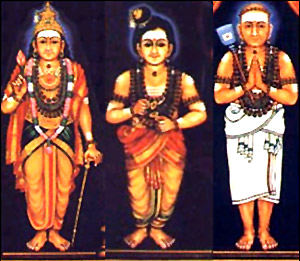Many intellectuals have studied the lives of saints all around India. However, these intellectual have been inspired by the lives of few saint. Among these insightful apotheoses, were the Nayanmars Saiva saints. The Saiva Nayanmars were simple hearted bhaktas rather than philosophical or theological pundits.
These people had understood the true nature of the world, and wanted only God. As the stories of the Nayanars illustrate, the devotee is ever ready to renounce all, in favour of devotion to Lord Siva. Chandesvara Nayanar, in his complete absorption in his worship, could inflict a mortal blow on his own father; but, that was because he saw not his father, but an obstacle to Siva puja. When Arivattaya Nayanar found, for instance, that his weak body was getting unfit to carry on his worship, he was ready to cut his own throat. If Murkha Nayanar chose to gamble and even resort to violence to carry out his vow, Kannappa Nayanar would pull out his own eyes to serve the Lord!
 This great truth has been beautifully brought out again and again in these lives - love of God completely removes the devotee`s attachment to his own body. In the case of all the Nayanars devotion invariably meant expansion of the heart, and, therefore, service and charity. It is essential that, in our study of these great lives, we take them as a whole: the sixty-three blending into one marvelous scripture on devotion. The story of Eripatha Nayanar, for instance, should be taken as an exhortation for us to kill lust, anger and greed, the powerful impediments on our spiritual path, which, in the twinkling of an eye wreck our worship of the Lord.
This great truth has been beautifully brought out again and again in these lives - love of God completely removes the devotee`s attachment to his own body. In the case of all the Nayanars devotion invariably meant expansion of the heart, and, therefore, service and charity. It is essential that, in our study of these great lives, we take them as a whole: the sixty-three blending into one marvelous scripture on devotion. The story of Eripatha Nayanar, for instance, should be taken as an exhortation for us to kill lust, anger and greed, the powerful impediments on our spiritual path, which, in the twinkling of an eye wreck our worship of the Lord.
If we study the lives as a whole, we will not fail to note that Anaya Nayanar, and Pusalar Nayanar hold before us the ideal para bhakta, supreme exemplars of the highest form of devotion.If we approach these saints with faith and devotion in our hearts, we shall grasp the message they have for us. We shall also understand why they gave such a great place to externals like the sacred ash, rudraksha, etc. These symbols remind one constantly of God and, when they are said to remove our sins, they remove our sinful tendencies, too, by constantly reminding us of God, and keeping evil out of our mind.
Some of the Nayanmars were gifted singers inspired by their devotion and have left behind an imperishable legacy of devotional poetry saved to posterity by Nambi Andar Nambi who arranged the available Saiva hymns into eleven tirumumis (1st seven called Tevuram - collectively the hymns of Sambandar, Appar and Sundaranar, the 8th being the work of Manickavachakar, 9th called Tiruisaippa - a miscellaneous collection, the 10th contains outpourings of poems from Nakkirar to Nambi Andar Nambi.
Manickavachakar and other three great Saiva Samayacharyars - Appar, Sambandar and Sundarar flourished in the Tamil country and sounded a clarion call, a call to self-knowledge, implicit self-surrender at the feet of the Supreme. Besides the 11 thirumurais, the Peria-puranam gives a comprehensive account of lives of the 63 Saiva saints revered. It has 4000 stanzas in which fact and legend mingle freely. The saints were drawn from all castes then known - kings, Brahmins, chieftains, merchants, farmers, shepherds, potters, weavers, hunters, fishermen, untouchables etc.




















